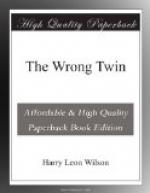“Gee, gosh!” muttered the Wilbur twin. This was indeed a splendid and desperate character, and he paid her the tribute of honest envy. He wished he might have a cruel stepmother of his own, and so perhaps be raised to this eminence of infamy. “I bet they did something with you!” he said.
The girl waved it aside with a gesture of repugnance, as if some things were too loathsome for telling. He perceived that she had, like so many raconteurs, allowed her cigar to go out.
“Here’s a match,” he said, and courteously cupped his hands about its flame. The pennygrab seemed to have become incombustible, and the match died futilely. “That’s my last match,” he said.
“Maybe I better keep this till I get to the great city.”
But he would not have it so.
“You can light it from mine,” and he brought the ends of the two penny grabs together.
“First thing you know you’ll be dizzy,” warned the moralist, Merle.
“Ho, I will not!”
She laughed in scorn, and valiantly puffed on the noisome thing. Thus stood Ben Blunt and the Wilbur twin, their faces together about this business of lighting up; and thus stood the absorbed Merle, the moral perfectionist, earnestly hoping his words of warning would presently become justified. It did not seem right to him that others should smoke when it made him sick.
At last smoke issued from the contorted face of Ben Blunt, and some of this being swallowed, strangulation ensued. When the paroxysm of coughing was past the hero revealed running eyes, but the tears were of triumph, as was the stoic smile that accompanied them.
And then, while the reformer Merle awaited the calamity he had predicted, while Wilbur surrendered anew to infatuation for this intrepid soul that would dare any crime, while Ben Blunt rocked on spread feet, the glowing pennygrab cocked at a rakish angle, while, in short, vice was crowned and virtue abased, there rang upon the still air the other name of Ben Blunt in cold and fateful emphasis. The group stiffened with terror. Again the name sounded along those quiet aisles of the happy dead. The voice was one of authority—cool, relentless, awful.
“Patricia Whipple!” said the voice.
The twins knew it for the voice of Miss Juliana Whipple, who had remotely been a figure of terror to them even when voiceless. Juliana was thirty, tall, straight, with capable shoulders, above which rose her capable face on a straight neck. She wore a gray skirt and a waist of white, with a severely starched collar about her throat, and a black bow tie. Her straw hat was narrow of brim, banded with a black ribbon. Her steely eyes flashed from beneath the hat. Once before the twins had encountered her and her voice, and the results were blasting, though the occasion was happier. Indeed, the intention of Juliana had been wholly amiable, for it was at the picnic of the Methodist Sunday-school.




